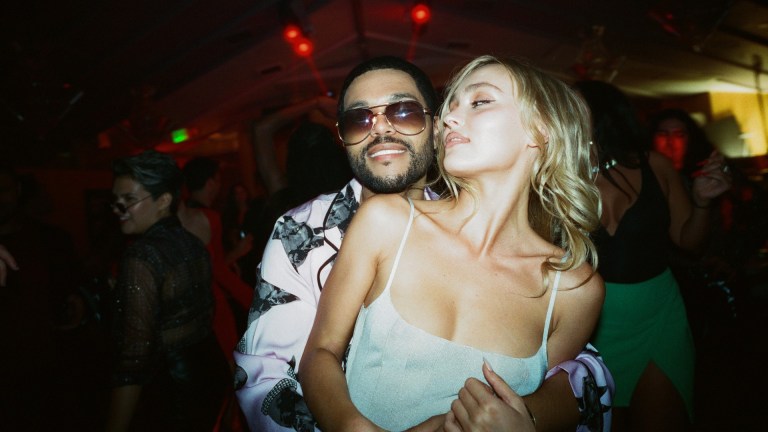4 Lessons The Idol Should Learn from Euphoria
If it wants to achieve HBO success, Sam Levinson's The Idol should follow the lead of Sam Levinson's Euphoria.

This article contains spoilers for the first episode of The Idol.
If you tuned into the series premiere of The Idol on HBO, you may have noticed several key characteristics of the storytelling approach of creator Sam Levinson. His artistic and visual flair is up front, in your face, loud, and claustrophobic. Bare breasts are often at risk of appearing every five minutes, drugs may be a catalyst for poor decision making, and strobe lights accompany deafening sound effects and musical tracks. Actors sometimes feel interchangeable in exchange for aesthetic flair, and this can bring mixed reactions from audiences.
If all of this sounds a little too familiar, it’s because Levinson is also the showrunner for one of HBO’s most popular shows, Euphoria. The infamous teen drama that sometimes resembles pornography more than premium cable television is on a lengthy hiatus right now, but most fans still have very specific images conjured in their heads when they watch the Zendaya-starring series.
With The Idol getting off to a poor start critically (it has a 29/100 rating on review aggregate site Metacritic), it may be important for Levinson and his team to take only the best aspects of Euphoria, evolve the ones that need major tweaking, and hone in on what can make this new show different. If they don’t heed the advice of their own past production calling for help, The Idol may be done in very short order.
Focus on the Main Character
Despite all of the controversy that surrounds Euphoria, there’s no denying the greatness of Zendaya. After garnering popularity in the Marvel Cinematic Universe in various Spider-Man films, the 27-year-old singer/actress has really showed off her acting chops as Rue Bennett. Rue is a disturbed, yet kind-hearted teen girl who wants to improve her chances in life, but drug addiction and severed ties with family get in the way. The trauma that surrounds Rue is acted with both delicacy and power by Zendaya, giving Euphoria a credibility it wouldn’t otherwise have.
The Idol needs to see whether Lily-Rose Depp can deliver a similar revelatory turn as Jocelyn. Depp’s depiction of a pop star in the pilot episode was a little bare-bones. Her character’s backstory is left ambiguous. We know the media gloms onto every mistake Jocelyn makes, from viral pictures of sexually explicit activities to criticism of her vocal chops on the mic. If Depp can layer Jocelyn with some emotional weight and give her the heft of a round main character rather than just a potpourri of trite tropes, this gives The Idol a chance at long-term success.
Use Sex Effectively, Not Effortlessly
Sam Levinson always has a lot to say about sex. In both of these series the characters aren’t anywhere close to bashful. You look down at your phone for one second to check a text, and when you look back up at your TV there’s a giant dong or a stream of seminal fluid brandishing a character’s visage. We don’t need to be prudes; it’s obvious that sex not only sells, but it also tells a good story if the writers know what they want to symbolize. The problem is that I’m not sure Euphoria or The Idol ever really have a vision propping up the private areas that are exposed on the screen.
There is a long-winded dialogue between several different characters in the premiere episode surrounding Jocelyn’s right to go full-frontal for a photoshoot that is about to go live. Jocelyn feels it’s her body, therefore her choice to display it for the masses. Others in her camp don’t necessarily agree with her, and the ensuing back and forth between the show business gremlins on the screen bring up some valid arguments for both sides of the coin.
No thesis statement is reached, though, meaning the conversation around a woman’s body and how much of it belongs to others is prominent in the first half of the episode just for the sake of talking about boobs. Levinson must start taking authoritative stances in his work instead of introducing adult content just to be provocative. The Handmaid’s Tale is a much more literary portrayal of these types of heavy dialogues.
Make Dialogue Matter
There are long stretches throughout The Idol in which characters don’t do much talking. The story is told instead through visual cues, bright hues, and techno dance tracks. The club scene in which Jocelyn meets The Weeknd’s character, Tedros, is an especially keen example of dialogue-drought. I don’t expect this show to have the Shakespearean-esque greatness of Succession when characters are verbally sparring, but there needs to be a focus on making words matter just as much as song lyrics blasting in the background. Euphoria’s best scene is rich with explosive line-delivery and physical acting (Rue’s second-season drug intervention). The Idol’s best scene so far is similarly a horrifying back and forth about the talent of Jocelyn and the purpose of her songwriting style when Jocelyn plays her most recent track for Tedros. The show should continue with these scenes for the rest of the first season and beyond.
Make the Supporting Cast More Interesting
There are a lot of minor characters that appear in the first episode of The Idol. From Dan Levy’s manic publicist character to Troye Sivan’s calculated creative director, there is some decent-sized star power in the series; it simply needs to be used for more than just starpower on a placard. Euphoria has several iconic supporting characters, such as abused trangender teen Jules (Hunter Schafer) and the two-timing cheater Cassie (Sydney Sweeney). These women not only enter Rue’s orbit, but they also morph into their own fascinating people. Supporting characters that branch off from the main plot and are given backstory and purpose help to make a show feel more realistic and lively.
The biggest candidate that can serve this role in The Idol is Tedros, the creepy nightclub owner played by recording artist Abel “The Weeknd” Tesfaye. His persona is ominous and cringe-worthy in a multitude of ways, and it’s up to Tesfaye to quickly adapt to the game of acting for his character to fulfill its potential. If he does, though, the show will have a relationship between Tedros and Jocelyn that can not only entertain, but also provoke analysis and thematic muscle.
New episodes of The Idol premiere Sundays at 9 p.m. ET on HBO.
